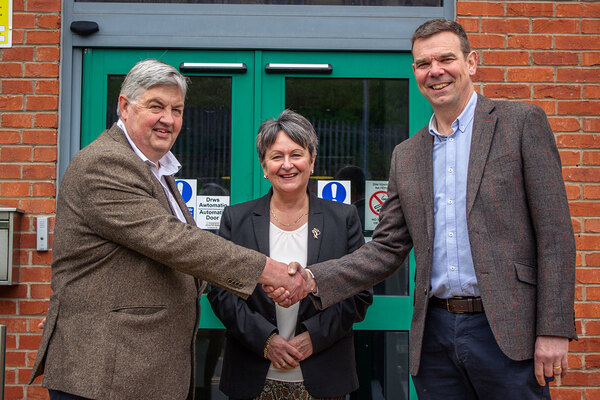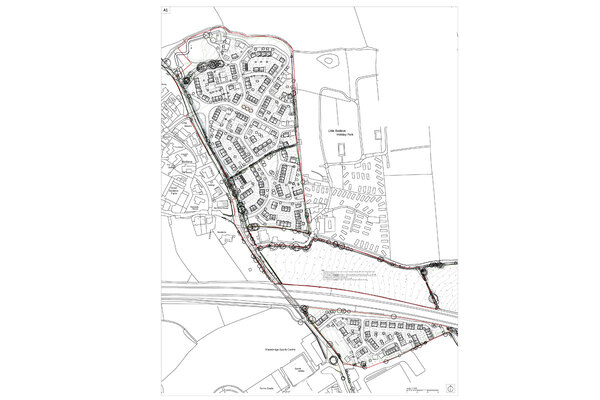Making a stand
Mill Group boss David Toplas controls an investment fund worth £500 million giving aspiring homeowners the chance to buy. He tells Jamie Obertelli why his home buying model is one others will follow.
‘It’s not just about buying a property and selling for a profit.’ This might sound like an outlandish statement coming from a property developer but to David Toplas, chief executive of property and finance company Mill Group, it makes perfect sense.
He and his firm grabbed business headlines towards the tail-end of last year by launching the first privately backed £500 million fund which co-invests with prospective homebuyers without large enough deposits to obtain mortgages. Mill Group is hoping to launch the fund to consumers in the second quarter of the year after, it claims, strong interest from the public. It is similar in principle to the government’s shared equity scheme.
The tens of thousands of people across the UK wondering if they will ever be able to get a foot on the housing ladder will be hoping that the Mill Group’s Investors in Housing fund will set a trend.’We have developed a model of housing tenure which we believe will become normal in high cost areas of the UK,’ hedges a businesslike Mr Toplas.
After initial introductions at his central London office, the Mill Group founder wastes no time setting his firm apart from other private backers, stressing its core ethos to provide socially responsible investment opportunities in the housing sector. ‘The firm always aims for long-term delivery and subsequent return for the community,’ he says.
Mr Toplas believes that the funding model set down by Investors in Housing will become commonplace in years to come. He predicts that homebuyers will increasingly prefer to invest in partnership with a private company instead of making the sudden leap from no ownership to owning 100 per cent of a property, he says matter-of-factly.
Neil Newton, former chair of the London Pensions Fund Authority, who has known Mr Toplas since 2001, certainly seems to have faith in the chief exec’s foresight, describing him as someone who ‘sees every issue and angle before other mortals’.
Mr Toplas formed the firm in 1994 after more than 20 years working for accountancy firm Arthur Anderson. His intention was to promote investment funds in property and infrastructure - mainly housing, schools, health, street lighting and other community private finance initiative investments throughout the UK.
Despite his experience working within the public sector, and in housing, Mr Toplas says his firm did a great deal of leg-work before it launched the Investors in Housing fund. ‘We have been researching the housing market for some three years now and are confident that institutional co-investment sits separately from the current government shared-ownership schemes, but in a totally complimentary sense,’ he says.
While Mr Toplas acknowledges the benefits of government programmes like homebuy direct, which offer equity loans towards the purchase of homes on selected developments, he is conscious that there simply isn’t enough money to subsidise all the people who need help with affordable housing in this country. Indeed, overwhelming demand for England’s ‘my choice homebuy’ scheme exhausted the £126 million fund last spring. Hopeful buyers north of the border were disappointed also when a similar £60 million fund for first-time buyers ran dry in November.
Money from the Mill Group’s fund is potentially available to all and has no restricting criteria. Applicants’ ability to keep their end of the bargain is assessed by an independent panel of financial advisors in much the same way that a mortgage lender would conduct an affordability review. ‘It’s a good thing the government does restrict criteria and should restrict it even more, so that those who really need it the most get the benefit of its schemes,’ says Mr Toplas. ‘Government schemes have a role to play and if we can establish a market, the private sector can cater for the people who do not meet their criteria.’
Though Mr Toplas’ scheme has far to go before its backers and future customers can call it a success, social landlords offering existing homebuy products broadly support its existence.
‘We know from our work in the homebuy market that many more people require an assisted product and it is a positive development that something else has been made available. This offering would go well with the government schemes already in place,’ says Marilyn DiCara, director of sales and marketing at housing association Moat.
The Mill Group boss has kept a close eye on the growing calls from the likes of Sir Bob Kerslake, chief executive of the Homes and Communities Agency, for public-private sector partnerships to kick-start house building. He warns that so far, there has not been enough response to make a real difference. The main challenge, he says, is getting these partnerships off the ground, and this takes a concerted effort on
both sides.
‘It is not an area the vast majority of the ordinary property world has had any time for and in that sense there is no great history of the public sector being good at engaging the private sector,’ he explains.
In spite of his wider misgivings about the future of PPPs and the ups and downs of the housing market, Mr Toplas predicts that the housing sector is going to hear a lot more from Mill Group. ‘The trick is to identify the ideas that are the most promising and will work best to solve the problems we are facing,’ he states finally. ‘And in that context I think we do have a strong contender.’
Other Mill Group investment funds
- The group launched its first infrastructure fund in 1998 with Norwich Union Public Private Partnership Fund, a joint venture with Norwich Union. The fund invested in 12 different projects with a value of more than £200 million.
- NUPP projects include Jubilee Square in Brighton, which provided 80 flats, and a number of local redevelopment schemes, schools, offices and community health projects.
- The same year the Mill Group created a £3 million fund - Investors in the Community Fund I - to enable investors to access the PFI sector through education projects.
- In 2004 the Mill Group launched the £60 million Investors in the Community Fund II, which was the first PPP investment fund backed equally by public and private sector institutions.
- The IICFII was the first public/private investment fund in PFI.







